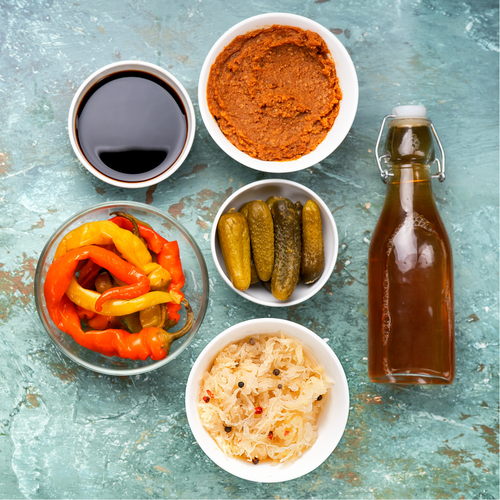Carbohydrates are like fuel for our bodies. However, our pain au chocolat is not an essential carbohydrate for our bodies.
MAKE THE DIFFERENCE BETWEEN SUGARS TO PREFER AND THOSE TO LIMIT
We can simplify things by saying that the sugars to favor are those that are found naturally in a product, such as fruits for example. Especially since when consuming fruits, the sugar or simple carbohydrate (fructose) that they contain is accompanied by fiber, which will slow down the absorption of this sugar and thus avoid a spike in blood sugar (blood sugar level). Not to mention that fruits provide many vitamins and minerals! Other sugars, called complex carbohydrates , are also found naturally in cereals, legumes, oilseeds, potatoes, sweet potatoes, but in a more “complex” form (starch) allowing them to provide energy to the body for a long time because they are diffused more slowly than simple carbohydrates (glucose, fructose, sucrose, lactose, maltose, galactose). This is why we think about making up our plate with ¼ of these complex carbohydrates.
Regarding sugars to limit , it is more about simple sugars added voluntarily in products such as sodas, sweets, cakes, fast food, alcohol but also in salty products such as cold cuts, sauces, pizzas, canned goods, cordon bleus etc. It would seem that nearly 70% of industrial salty products contain added sugar to enhance the taste. But it is also widely used as a preservative and to improve the appearance of products.
THE PROBLEM WITH ADDED SUGAR
Excessive sugar consumption has many harmful effects on health:
> It can make us addicted. In fact, it alters the reward circuit and our body demands a little more of it every day.
> It accelerates brain aging and alters the physical appearance of the body as a whole.
> Sugar is very acidifying for the body, which makes it particularly conducive to the development of diseases.
> It disrupts the proper functioning of our immune system by preventing the proper absorption of vitamin C. This results in white blood cells (our dear little soldiers) that are less effective in fighting potential pathogens.
> A diet high in sugar can alter intestinal permeability. However, if this permeability is affected, the small holes in the intestinal barrier, which control the exchange of various nutrients, widen and allow unwanted molecules to pass through. And these molecules can lead to uncontrolled inflammation.
In summary, high sugar consumption is a source of imbalance in our intestinal microbiota and causes skin, weight, stress and sleep problems, and affects our immune system.
BETTER MANAGE YOUR SUGAR CONSUMPTION
> Have a savory breakfast! Indeed, a carbohydrate fast really helps reduce your sugar consumption and does a lot of good for your body, which finds itself less overloaded from the start of the morning. So we focus on a savory breakfast (2 slices of sourdough bread + 1 small avocado + 1 poached egg + spices of your choice) which will make the body's work easier, allowing it to rest and then function better.
> We're betting on better alternatives : we've already mentioned it, but fruit shouldn't be avoided. You can eat 1 to 3 per day maximum (we're not exaggerating, it's still sugar, even natural). Eat it raw or to flavor plain yogurt or homemade cakes, it also provides good micronutrients. You can also turn to sources of low-glycemic carbohydrates like acacia honey, or natural and organic stevia. Once again, these are better alternatives than table sugar, but we'll keep the quantities reasonable.
> Sort through labels : as we mentioned above, even savory products contain sugar, often without us realizing it. And there are many sugar derivatives (nearly sixty) that can be difficult to detect...at least until you read this article! So learn to identify names ending in "ose" like dextrose, fructose, maltose, sucrose, but also syrups like glucose syrup, corn syrup, barley malt syrup, invert sugar syrup, maple syrup, agave syrup. And other names like maltodextrin, caramel, molasses, etc.
> Keep an eye on the nutritional values table : below carbohydrates you will find “of which sugars” which refers to simple sugars. To help you navigate, remember that any value below 5g per 100g of solid product, and 2.5g per 100ml of liquid product is perfectly reasonable. When products indicate an amount higher than 10-15g, try to find a less sugary alternative. Especially if you consume more than 100g of product.
To learn more about detox and its many benefits, click here !
Sources:
[1] Wölnerhanssen BK, Meyer-Gerspach AC. Effekte von Zuckerkonsum auf die Gesundheit und mögliche Alternativen [Health effects of sugar consumption and possible alternatives]. Ther Umsch. 2019 Sep;76(3):111-116. German. doi:10.1024/0040-5930/a001070. PMID: 31498044.
[2] DiNicolantonio JJ, O'Keefe JH, Wilson WL. Sugar addiction: is it real? A narrative review. Br J Sports Med. 2018 Jul;52(14):910-913. doi:10.1136/bjsports-2017-097971. Epub 2017 Aug 23. PMID: 28835408.
[3] Freeman CR, Zehra A, Ramirez V, Wiers CE, Volkow ND, Wang GJ. Impact of sugar on the body, brain, and behavior. Front Biosci (Landmark Ed). 2018 Jun 1;23(12):2255-2266. doi:10.2741/4704. PMID: 29772560.
[4] Tan HE, Sisti AC, Jin H, Vignovich M, Villavicencio M, Tsang KS, Goffer Y, Zuker CS. The gut-brain axis mediates sugar preference. Nature. 2020 Apr;580(7804):511-516. doi:10.1038/s41586-020-2199-7. Epub 2020 Apr 15. PMID: 32322067; PMCID: PMC7185044.
[5] Mantantzis K, Schlaghecken F, Sünram-Lea SI, Maylor EA. Sugar rush or sugar crash? A meta-analysis of carbohydrate effects on mood. Neurosci Biobehav Rev. 2019 Jun;101:45-67. doi: 10.1016/j.neubiorev.2019.03.016. Epub 2019 Apr 3. PMID: 30951762.














